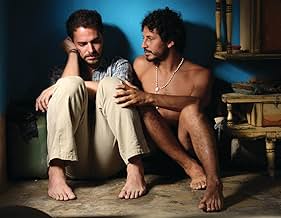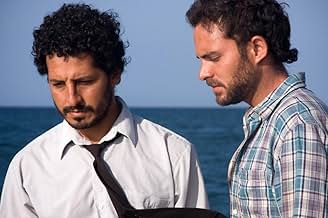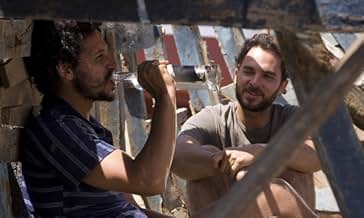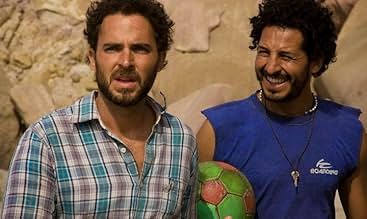ÉVALUATION IMDb
7,7/10
7,4 k
MA NOTE
Ajouter une intrigue dans votre langueAn unusual ghost story set on the Peruvian seaside; a married fisherman struggles to reconcile his devotion to his male lover within his town's rigid traditions.An unusual ghost story set on the Peruvian seaside; a married fisherman struggles to reconcile his devotion to his male lover within his town's rigid traditions.An unusual ghost story set on the Peruvian seaside; a married fisherman struggles to reconcile his devotion to his male lover within his town's rigid traditions.
- Director
- Writer
- Stars
- Prix
- 13 victoires et 13 nominations au total
Humberto Cavero
- Padre Juan
- (as Julio Humberto Cavero)
Liliana Alegría
- Carlota
- (as Liliana Alegria Saavedra)
Tomas Fernandez
- Sabino
- (as Tomás Fernández)
Avis en vedette
I know a movie is excellent when the day after seeing it I still have a pit in my stomach as I did after watching this one. I know there are going to be some great reviews written about this so I'm only going to add to the momentum briefly without trying to find ways to get you to watch this one.
I felt bad for nearly every character in this movie...not just for those directly experiencing the effects of forbidden love but also for society observing it. Here, a seaside village in Peru questions its own moral code when a well-liked member of the community must decide whether to place his love for another man before social acceptance. Superb acting, character evolution, simple but engaging plot, and exhausting emotion all converge in this touching story.
I felt bad for nearly every character in this movie...not just for those directly experiencing the effects of forbidden love but also for society observing it. Here, a seaside village in Peru questions its own moral code when a well-liked member of the community must decide whether to place his love for another man before social acceptance. Superb acting, character evolution, simple but engaging plot, and exhausting emotion all converge in this touching story.
This movie gathers impetus as it goes along, so that by the end you are completely caught up in its complex and very moving depiction of the twists and turns of the human heart. The story exists on several levels--love story; political/religious commentary; ghost story. Filmed in a seaside village in Peru, the movie has beautiful cinematography, and the music soundtrack is also evocative of a culture far removed from city life. The three principal actors are superb, especially Cristian Mercado as the tormented husband/lover. The supporting players are also outstanding, each contributing to the overall depiction of the townspeople observing the drama that unfolds. I won't give the plot away except to say that it exists on more than one level of reality. Highly recommended.
There are lots of things that are not told to us in the beginning or middle of this movie. We do not know who are the characters, where they came from or how they started their relationships. The truth is, we do not need to know that. What we need and by the end of the movie what we want to acknowledge is that this is a movie about love (or different types of love). A movie about grieve and it's most different ways of being expressed. A movie about people and about the way they struggle through their lives to hide what they really are and what or who they really role. This is a movie about loss and pain and also about joy and happiness. In the end, this a movie about being human.
The script is remarkable and it runs away from the clichés and the preconceived ideas you might take while you are walking in the projection room. But even more remarkable are the 3 main characters and the actors who portray them. Cristian Mercado delivers a masterclass in acting. By a comfortable mile, one of the best male acting performances of the year. What is most admirable is the way Mercado can express Miguel's painful grievance: the loss of his lover, the acceptance of what he really his and the loss of his beloved wife and son - there are no hysteric portraits of loss. What you get to see is a outstanding performance focused on the facial and physical expression. Also fantastic the the performance by the Mexican actress Tatiana Astengo.
Could this be one of the front runners for the Best Foreing Language movie of the year? No doubt about it.
The script is remarkable and it runs away from the clichés and the preconceived ideas you might take while you are walking in the projection room. But even more remarkable are the 3 main characters and the actors who portray them. Cristian Mercado delivers a masterclass in acting. By a comfortable mile, one of the best male acting performances of the year. What is most admirable is the way Mercado can express Miguel's painful grievance: the loss of his lover, the acceptance of what he really his and the loss of his beloved wife and son - there are no hysteric portraits of loss. What you get to see is a outstanding performance focused on the facial and physical expression. Also fantastic the the performance by the Mexican actress Tatiana Astengo.
Could this be one of the front runners for the Best Foreing Language movie of the year? No doubt about it.
One of the best new films exploring gay male identity, love and relationships, and likely will be a worthy addition to many personal "favorite gay films" lists, although the fact that the film is set in a town, and to some extent a culture, where, at least for a large part of the story, many in the town have not yet evolved in their views of LGBT people and issues, created some (ultimate unnecessary) anxiety for me early in the film, and at parts throughout, as to whether the film would be a throwback to older, more stereotyped and limited representations and stories of gay life, although those anxieties were not only relieved by the end of the film, but, as I suggested, the film is an extremely valuable addition to the new wave of gay cinema.
The writer, director, casting director and cast, cinematographer, set designer and other members of the film-making team also do a great job exploring rural, small town life, with its traditions (religious and otherwise...) superstitions, and class differences, and the interplay among the individuals, families and community who inhabit the town, along with the welcome (or rejection...) given to a stranger who comes there, and who many perceive as a threat to the social fabric of the town, and the support (or lack of it...) the townspeople and characters show to each other, ultimately examining the struggle between bigotry and ignorance, on the one hand, and the struggle to overcome that bigotry and ignorance, and replace it with support, respect and love on the other. Most of the townspeople are not financially well-off, but make just enough to get by, working in occupations connected to fishing and the sea, and the way they relate, individually and as a community, to each other (and to themselves, in regard to what is the true definition of a man, of an individual's self-respect) in light of a newcomer who is more financially well-off, and his artistic and suspected sexual/relationship interests, are additional themes of the film, which play out so well in a beautiful, interesting and captivating way, often evoking strong emotions, and at times offering an inspiring catharsis (and perhaps a few tears, in reaction to some sadness, and much beauty.)
And there are many other highlights of the film beyond all that, including the amazingly beautiful setting, in a rural, seaside Peruvian village, the cinematography, musical score, performances, plot twists and turns, the mix of fantasy and reality (and moments where it's unclear to what extent fantasy exists as an aspect of the story's reality.) This is a truly unique and creative film, and one of the most rewarding experiences I've had at a feature film in a long time.
The writer, director, casting director and cast, cinematographer, set designer and other members of the film-making team also do a great job exploring rural, small town life, with its traditions (religious and otherwise...) superstitions, and class differences, and the interplay among the individuals, families and community who inhabit the town, along with the welcome (or rejection...) given to a stranger who comes there, and who many perceive as a threat to the social fabric of the town, and the support (or lack of it...) the townspeople and characters show to each other, ultimately examining the struggle between bigotry and ignorance, on the one hand, and the struggle to overcome that bigotry and ignorance, and replace it with support, respect and love on the other. Most of the townspeople are not financially well-off, but make just enough to get by, working in occupations connected to fishing and the sea, and the way they relate, individually and as a community, to each other (and to themselves, in regard to what is the true definition of a man, of an individual's self-respect) in light of a newcomer who is more financially well-off, and his artistic and suspected sexual/relationship interests, are additional themes of the film, which play out so well in a beautiful, interesting and captivating way, often evoking strong emotions, and at times offering an inspiring catharsis (and perhaps a few tears, in reaction to some sadness, and much beauty.)
And there are many other highlights of the film beyond all that, including the amazingly beautiful setting, in a rural, seaside Peruvian village, the cinematography, musical score, performances, plot twists and turns, the mix of fantasy and reality (and moments where it's unclear to what extent fantasy exists as an aspect of the story's reality.) This is a truly unique and creative film, and one of the most rewarding experiences I've had at a feature film in a long time.
I haven't seen such a touching gay movie since Brokeback Mountain. The movie contains so many issues, yet it could still cover them all and touch the deepest emotions in my heart. The depiction of each character is so profound that you can't help feeling the way they experienced.
Everyone is selfish when it comes to love, and so was Miguel. After he found the way how his wife and Santiago could coexist, he decided not to salvage the body and let Santiago rest in peace. He wanted Santiago to exist just for him, without the risk their relationship to be discovered. But not soon after the rumor of the painting ran wild in the village, his ideal pattern of coexistence vanished! In substitution, here comes the suspicion along with the despite from the so-called innocent village. Miguel's wife is just an ordinary woman who couldn't accept the fact that her husband was screwing other man, but the courage and tolerance she maintained is quite extraordinary. Love is the only way to get through this kind of grief. It's true for Miguel for that the loss of his lover and the courage to admit the rumor. On the other hand, it's also true for Miguel's wife who had to raise her child under this circumstance, not to mention the pressure and gossip she had to put up with.
Masculinity is always a main concept in gay movies. Therefore, Miguel had to struggle with his identification like most conservative gay did. In some way, Santiago is not just his lover, but also the desire of freedom which he had been longed for decades. When Miguel made up his mind to fulfill Santiago's last wish no matter what it costs, the determination and courage he showed really made me weep. No doubt that's the moment he found his own freedom and became a true macho!
Tragedy is when love no longer existed, so I would rather say this movie is about love and forgiveness. For those who has been struggled for their identification, this is a must see movie. Furthermore, for those who be the reason some have to struggle for anything, this is definitely a movie you can' t miss!
Everyone is selfish when it comes to love, and so was Miguel. After he found the way how his wife and Santiago could coexist, he decided not to salvage the body and let Santiago rest in peace. He wanted Santiago to exist just for him, without the risk their relationship to be discovered. But not soon after the rumor of the painting ran wild in the village, his ideal pattern of coexistence vanished! In substitution, here comes the suspicion along with the despite from the so-called innocent village. Miguel's wife is just an ordinary woman who couldn't accept the fact that her husband was screwing other man, but the courage and tolerance she maintained is quite extraordinary. Love is the only way to get through this kind of grief. It's true for Miguel for that the loss of his lover and the courage to admit the rumor. On the other hand, it's also true for Miguel's wife who had to raise her child under this circumstance, not to mention the pressure and gossip she had to put up with.
Masculinity is always a main concept in gay movies. Therefore, Miguel had to struggle with his identification like most conservative gay did. In some way, Santiago is not just his lover, but also the desire of freedom which he had been longed for decades. When Miguel made up his mind to fulfill Santiago's last wish no matter what it costs, the determination and courage he showed really made me weep. No doubt that's the moment he found his own freedom and became a true macho!
Tragedy is when love no longer existed, so I would rather say this movie is about love and forgiveness. For those who has been struggled for their identification, this is a must see movie. Furthermore, for those who be the reason some have to struggle for anything, this is definitely a movie you can' t miss!
Le saviez-vous
- AnecdotesAlthough both main characters are Peruvian, the actors who play them are not. Cristian Mercado (the Fisherman) is Bolivian and Manolo Cardona (the Photographer) is Colombian.
- ConnexionsFeatures Direito de Amar (1987)
Meilleurs choix
Connectez-vous pour évaluer et surveiller les recommandations personnalisées
- How long is Undertow?Propulsé par Alexa
Détails
- Date de sortie
- Pays d’origine
- Sites officiels
- Langue
- Aussi connu sous le nom de
- Undertow
- Lieux de tournage
- sociétés de production
- Consultez plus de crédits d'entreprise sur IMDbPro
Box-office
- Brut – États-Unis et Canada
- 108 620 $ US
- Fin de semaine d'ouverture – États-Unis et Canada
- 6 749 $ US
- 19 sept. 2010
- Brut – à l'échelle mondiale
- 602 059 $ US
Contribuer à cette page
Suggérer une modification ou ajouter du contenu manquant

Lacune principale
By what name was Contracorriente (2009) officially released in India in English?
Répondre























